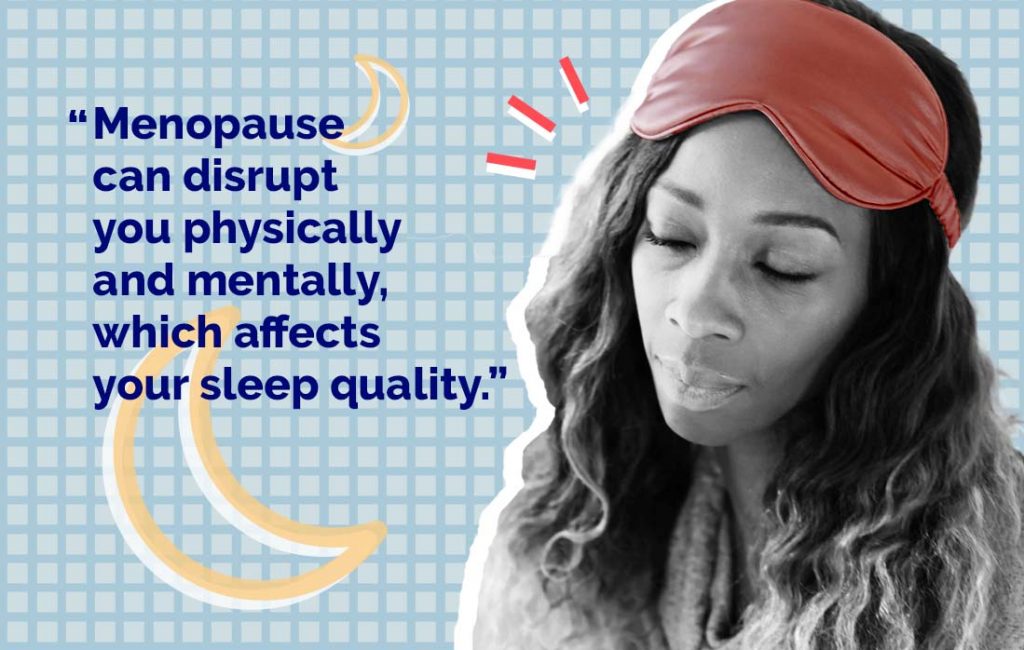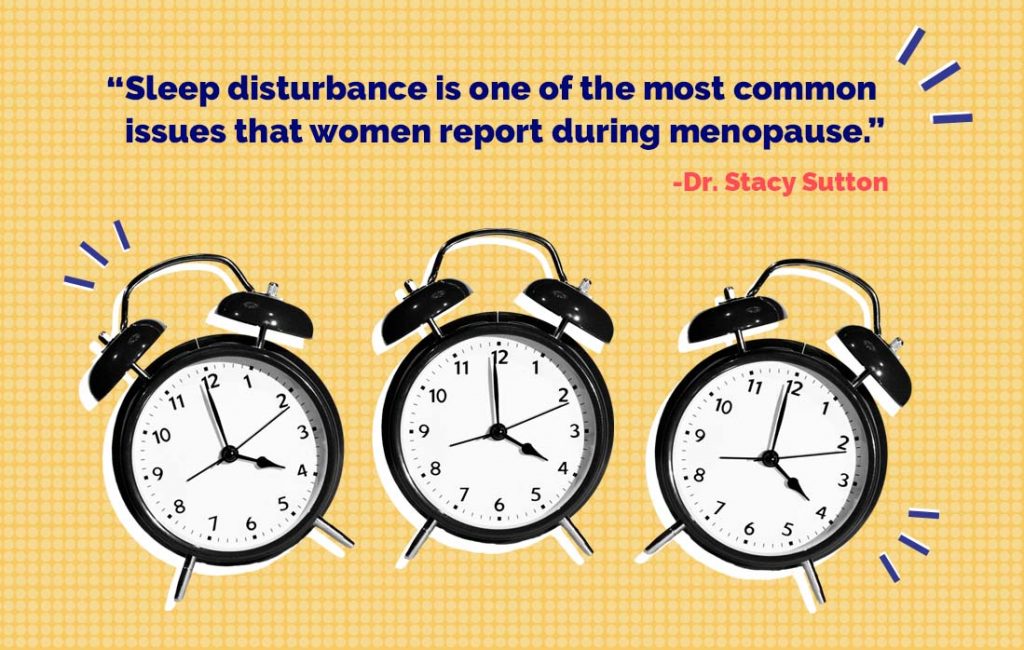Menopause and sleep, an intricate connection that profoundly influences the well-being of women, invites us to delve into a realm where hormonal shifts and nocturnal disturbances intertwine. This comprehensive exploration unveils the myriad ways menopause affects sleep patterns, unraveling the underlying mechanisms and offering practical strategies for navigating this transformative journey.
As women transition through menopause, their bodies undergo a symphony of physiological changes, including a decline in estrogen and progesterone levels. These hormonal fluctuations can disrupt the delicate balance of the sleep-wake cycle, leading to a cascade of sleep disturbances.
Menopause and Sleep Overview

Menopause is the natural biological process that marks the end of a woman’s reproductive years. It typically occurs between the ages of 45 and 55, although it can happen earlier or later for some women. During menopause, the ovaries gradually stop producing estrogen and progesterone, which are hormones that play a crucial role in regulating sleep patterns.
The decline in estrogen levels during menopause can lead to a range of sleep disturbances, including difficulty falling asleep, frequent awakenings during the night, and early morning awakenings. These sleep problems can significantly impact a woman’s quality of life, causing fatigue, irritability, and difficulty concentrating.
Symptoms of Menopause
- Hot flashes and night sweats
- Mood swings and irritability
- Vaginal dryness
- Sleep disturbances
- Weight gain
- Loss of bone density
Common Sleep Problems During Menopause
As women transition through menopause, hormonal changes can disrupt their sleep patterns. Common sleep problems experienced during this time include insomnia, night sweats, and hot flashes.
These sleep disturbances can significantly impact sleep quality and duration. Insomnia, characterized by difficulty falling or staying asleep, can lead to daytime fatigue, irritability, and impaired cognitive function. Night sweats and hot flashes, sudden episodes of intense heat and sweating, can disrupt sleep by causing awakenings and discomfort.
Insomnia
- Difficulty falling asleep
- Frequent awakenings during the night
- Early morning awakenings with difficulty returning to sleep
Night Sweats and Hot Flashes
- Episodes of intense sweating that occur at night
- Hot flashes that can disrupt sleep by causing awakenings and discomfort
- Can lead to dehydration and electrolyte imbalances
Lifestyle Modifications for Improved Sleep
Adopting healthy lifestyle habits can significantly enhance sleep quality during menopause. These modifications include establishing a regular sleep schedule, creating a relaxing bedtime routine, and making dietary adjustments.
Establishing a regular sleep schedule helps regulate the body’s natural sleep-wake cycle. Going to bed and waking up around the same time each day, even on weekends, reinforces the body’s natural rhythm and promotes restful sleep.
Creating a Relaxing Bedtime Routine, Menopause and sleep
Creating a relaxing bedtime routine can help signal the body that it is time to sleep. This routine may include activities such as taking a warm bath, reading a book, or listening to calming music. Avoiding screen time before bed is also beneficial, as the blue light emitted from electronic devices can interfere with sleep.
Dietary Changes
Dietary changes can also impact sleep quality. Limiting caffeine and alcohol intake can be helpful. Caffeine is a stimulant that can keep you awake, while alcohol can disrupt sleep patterns and lead to fragmented sleep.
Hormone Therapy for Sleep Improvement: Menopause And Sleep

Hormone replacement therapy (HRT) is a treatment option that can help alleviate sleep disturbances during menopause. It involves taking hormones, such as estrogen and progesterone, to supplement the declining levels that occur during this transition.
HRT can improve sleep quality by:
- Reducing hot flashes and night sweats, which can disrupt sleep.
- Improving mood and reducing anxiety, which can interfere with sleep.
- Increasing levels of melatonin, a hormone that helps regulate sleep.
Benefits of HRT
The potential benefits of HRT for sleep improvement include:
- Reduced sleep disturbances, such as hot flashes, night sweats, and insomnia.
- Improved sleep quality and duration.
- Reduced daytime fatigue and improved mood.
Risks of HRT
It is important to discuss the potential risks of HRT with a healthcare professional before starting treatment. These risks may include:
- Increased risk of breast cancer, heart disease, and stroke.
- Blood clots.
- Nausea, bloating, and breast tenderness.
The risks and benefits of HRT should be carefully considered before making a decision about whether or not to start treatment.
Other Medical Treatments for Sleep Disorders

Non-hormonal medications, such as sedatives and hypnotics, can be prescribed to improve sleep quality during menopause. These medications work by reducing brain activity and promoting relaxation, making it easier to fall and stay asleep. However, it’s important to note that these medications should be used cautiously and only under the guidance of a healthcare professional, as they can have side effects such as drowsiness, dizziness, and impaired cognitive function.
Cognitive Behavioral Therapy for Insomnia (CBT-I)
Cognitive behavioral therapy for insomnia (CBT-I) is a non-drug treatment that can help improve sleep quality by addressing the underlying thoughts and behaviors that contribute to insomnia. CBT-I involves working with a therapist to identify and change negative thoughts and behaviors related to sleep, develop relaxation techniques, and establish a regular sleep-wake cycle.
This therapy has been shown to be effective in reducing insomnia symptoms and improving sleep quality in postmenopausal women.
Complementary Therapies for Sleep Support
In addition to lifestyle modifications and medical treatments, complementary therapies can provide additional support for improving sleep during menopause. These therapies aim to promote relaxation, reduce stress, and enhance overall well-being, which can positively impact sleep quality.
Some common complementary therapies for sleep support during menopause include:
Acupuncture
Acupuncture involves the insertion of thin needles into specific points on the body. It is believed to stimulate the release of endorphins, which have pain-relieving and calming effects. Studies have shown that acupuncture can improve sleep quality and reduce insomnia symptoms in menopausal women.
Yoga
Yoga combines physical postures, breathing exercises, and meditation to promote relaxation and reduce stress. Practicing yoga regularly can help improve sleep quality, reduce anxiety, and enhance overall well-being.
Meditation
Meditation involves focusing the mind on a specific object, thought, or activity. It can help reduce stress, improve relaxation, and promote emotional well-being. Mindfulness-based meditation techniques have been shown to improve sleep quality and reduce insomnia symptoms in menopausal women.
Impact on Daily Life and Relationships
Sleep deprivation during menopause can have significant consequences for daily life and relationships. It can lead to a decline in mood, energy levels, and cognitive function, which can impact overall well-being and productivity.
Consequences for Mood and Energy Levels
- Increased irritability and mood swings
- Difficulty concentrating and making decisions
- Reduced motivation and energy levels
- Increased risk of depression and anxiety
Impact on Cognitive Function
- Impaired memory and attention
- Difficulty learning new information
- Reduced problem-solving abilities
- Increased risk of accidents and injuries
Consequences for Relationships
Sleep problems during menopause can also strain relationships. Irritability, mood swings, and fatigue can make it difficult to interact with others in a positive and productive way. This can lead to conflicts, misunderstandings, and decreased intimacy.
- Increased tension and conflict with partners
- Reduced communication and emotional connection
- Difficulty managing household responsibilities and childcare
- Withdrawal from social activities and interactions
Popular Questions
How does menopause affect sleep?
Menopause can trigger a range of sleep disturbances, including insomnia, night sweats, and hot flashes, due to hormonal fluctuations and physiological changes.
What lifestyle modifications can improve sleep during menopause?
Establishing a regular sleep schedule, creating a relaxing bedtime routine, and limiting caffeine and alcohol intake can significantly enhance sleep quality.
What is hormone replacement therapy (HRT) and how does it help with sleep?
HRT involves taking hormones to supplement the declining levels during menopause, which can alleviate sleep disturbances by restoring hormonal balance.
What are some complementary therapies that support sleep during menopause?
Alternative therapies such as acupuncture, yoga, and meditation have shown promise in improving sleep quality by promoting relaxation and reducing stress.